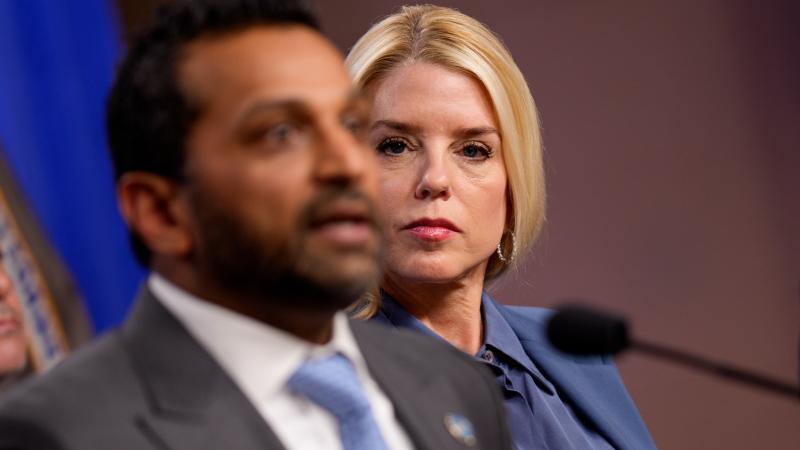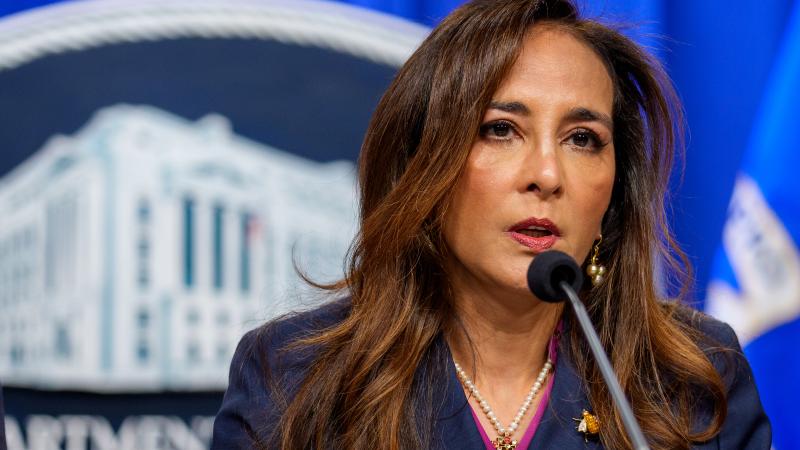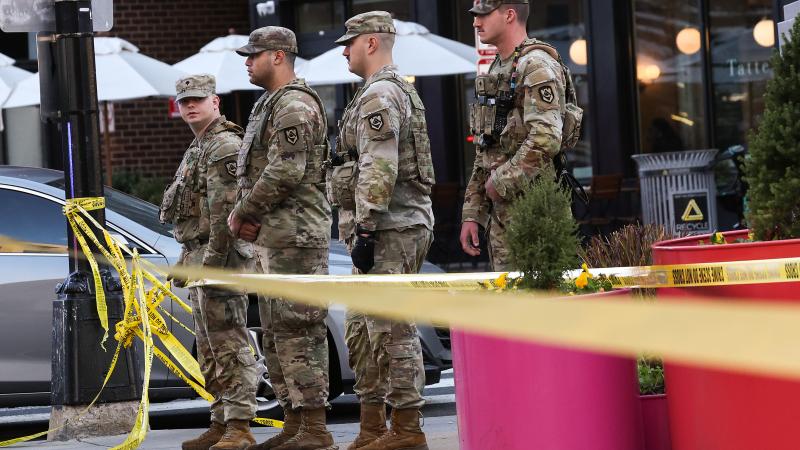Missouri case that toppled GOP governor boomerangs on Soros-backed prosecutor
St. Louis circuit attorney faces grand jury probe, chief investigator indicted in echoes of Trump-Russia collusion reversal in Washington.
Kimberly Gardner made history in 2016, roaring to an election victory as St. Louis city’s first African-American chief prosecutor on a campaign funded heavily by the liberal mega-donor George Soros. Four years later, she finds herself under investigation and her chief investigator already indicted for a prosecution gone bad, one that forced Missouri’s Republican governor to resign in what some now believe may have been a political attack.
Gardner, a Democrat and the city’s circuit attorney, was forced in 2018 to withdraw her indictment accusing Gov. Eric Greitens of felony invasion of privacy for allegedly taking a picture of his scantily clad girlfriend and threatening to release it if she talked about their affair. Gardner’s office dropped the charge after admitting she did not have proof of the photo or its transmission.
Click here to listen to Greitens talk about the case.
Investigators now allege the Greitens prosecution, which forced the governor to resign less than two years into his tenure, was built on lies that included perjury and hiding exculpatory evidence that would have helped demonstrate Greitens' innocence, court documents show.
Most significantly, testimony transcripts and court records obtained by Just the News show the woman Gardner built her case around, beautician Katrina Sneed, testified she was asked unsolicited by Gardner’s office to come forward as a witness and that she was actually reluctant to accuse Greitens because the entire story of a photo on his mobile phone may have been a dream.
“And at any point where you were in the basement with E.G. (Eric Greitens) at his home, did you see what you believed to be a phone?” Sneed was asked during an April 6, 2018 pretrial deposition with defense lawyers.
Sneed answered: “So not that’s like a very vivid memory which is the reason why I haven’t talked about it because I don’t know if it’s because I’m remembering it through a dream or I — I’m not sure, but yes, I feel like I saw it after that happened, but I haven’t spoken about it because of that.”
The magnitude of alleged holes and potential misconduct in the case that Gardner brought against Greitens have been laid bare in subsequent court filings, which include a seven-count felony indictment against Gardner's chief investigator in the case, William Tisaby.
The new evidence has not only engulfed her office in controversy; it has also drawn comparisons in Washington to the Russia collusion allegations against President Trump that were leaked and investigated, only to be debunked after a nearly three-year drama.
“Ms. Gardner tampered with the integrity of the grand jury and our judicial system by feloniously causing an indictment of a man for whom she did not have the evidence,” said Dwight Warren, who worked for 40 years as a prosecutor in the St. Louis circuit attorney’s office before he was fired by Gardner in 2017. “If the system is to command the respect of its citizens, they need to trust their prosecutor to be fair.”
Warren turned the tables on his former boss after his firing, writing an explosive op-ed in spring 2018 that declared there was no basis for Gardner’s indictment of Greitens. His prediction proved true within a few months.
Gardner to date has not been charged with wrongdoing and has steadfastly denied she engaged in any misconduct, even as the city police and a special prosecutor have charged her former investigator in the case, the ex-FBI agent Tisaby, with six counts of perjury and one count of evidence tampering in the Greitens case. Tisaby has pleaded innocent. His lawyer, Jermaine Wooten, did not immediately return a call seeking comment but has said previously his client is "absolutely 100 percent innocent" and a victim of discrimination.
Gardner has been ordered to appear before the grand jury, and is listed as a potential witness in Tisaby’s criminal trial later this month.
Facts disclosed in the Tisaby indictment suggest Gardner herself was complicit in his wrongdoing by staying silent while Tisaby allegedly lied. For instance, the special prosecutors alleged that when Tisaby falsely denied during a March 2018 pretrial deposition in the Greitens case that there was a functioning videotape of the Sneed interview, Gardner did not correct him even as she questioned him.
“There is no recording of this interview?,” Tisaby was asked by Gardner. “None whatsoever,” he answered.
Tisaby's indictment declared that Gardner's office had videotaped the sessions and she "failed to disclose the fact for several months."
Prosecutors say a functioning videotape was found in Gardner’s office, and the camera had not malfunctioned as had been claimed, according to the Tisaby indictment.
The Greitens case isn’t the only controversy impacting Gardner: More than 70 prosecutors in her office have been fired or forced to quit and dozens of St. Louis police officers have been banned from testifying in court. She also was fined more than $60,000 for campaign finance violations. After signing a plea deal, Gardner issued a statement blaming clerical errors for the campaign violations and accusing a "Republican political operative" for filing the complaint against her.
Gardner claims she is a victim of her efforts to clean up what she says is a dirty and racist law enforcement system in St. Louis, going so far as to file a lawsuit against the city earlier this year under a law created to fight the Ku Klux Klan back in 1871.
Gardner declined comment through her media spokesperson, who forwarded a copy of her prior statement about the civil rights litigation.
“Gardner was elected in 2016 on a promise to redress the scourge of historical inequality and rebuild trust in the criminal justice system among communities of color,” Gardner’s complaint reads. “Unfortunately, entrenched interests in St. Louis, including Defendants, have mobilized to thwart these efforts through a broad campaign of collusive conduct."
No matter which side prevails in the coming months, the investigators who went after Greiten are clearly now the investigated, much like the FBI and DOJ officials, who opened the Trump-Russia collusion probe during the 2016 election find themselves in Washington under Attorney General William Barr.
Greitens says he believes he was forced to give up his governorship for allegations that were unsubstantiated at best, and outright false at worst. While he admits an extramarital affair with Sneed, he has always denied Gardner's charge.
The rollercoaster experience has given Greitens thoughts of running again to reclaim the governorship, though those plans are on hold. A former Navy SEAL, Greitens nonetheless has been able to claim vindication recently.
Earlier this month, the Missouri Ethics Commission cleared Greitens of charges lodged against him during the height of the scandal that he had violated campaign finance laws. The commission “found no evidence of any wrongdoing on the part of Eric Greitens” but fined his campaign for two reporting violations.
"It's good to have been exonerated. I'm glad that the truth is coming out,” Greitens told Just the News, comparing his plight to that of Trump during the Russia collusion case. “All Americans need to know that the left and deep state insiders engaged in a criminal effort to overturn the 2016 election."
This tale of political intrigue and problematic prosecution dates back to spring 2016, when Gardner ran for St. Louis Circuit Attorney and won, a popular African-American rising to power as the city’s chief prosecutor in the aftermath of the racially tinged police shooting in nearby Ferguson, Mo.
Soros, one of the largest liberal benefactors in history, donated $630,000 that year to a political action committee called Safety and Justice Committee. That super PAC in turn donated more than $204,000 as an in-kind donation to Gardner’s election. Soros’ support accounted for about two-thirds of her total campaign donations of nearly $300,000, according to a post-election filing with the Missouri Ethics Commission. Gardner’s platform of criminal justice reform to help minorities proved a nice fit for Team Soros.
Michael Vachon, a spokesman for Soros, declined comment on Gardner and the Missouri controversy.
Greitens stunned the Missouri establishment in November 2016 by capturing the governorship. And quickly he set out to make good on his promises, which included cutting back a low-income housing program that awarded tax credits worth hundreds of millions of dollars to the state’s politically connected.
The storm clouds officially formed the day after Greitens delivered his second State of the State address in January 2018. That’s when Gardner announced that she was opening a criminal investigation into the governor about his extramarital affair with Sneed, which Greitens had just admitted to publicly.
Gardner claimed she was opening the probe that day solely because she wanted to determine if any criminality was involved during the affair, which began in 2015 before Greitens was elected.
Evidence that has emerged in recent months conflicts with Gardner's claim, indicating she had opened the investigation weeks earlier on Dec. 22, 2017, according to a computer time stamp on the actual indictment. Gardner's decision-making in the case immediately drew questions.
Instead of choosing an investigator from the local police or her own office, Gardner hired outside investigative help. One of Gardner’s former classmates from St. Louis University Law School recommended Tisaby to Gardner. Tisaby didn’t even live in Missouri. He co-founded Enterra, an investigative company, based in Rochester, Mich., according to Tisaby’s indictment.
Warren, the former prosecutor, said Tisaby’s hiring was unprecedented. “Not once has a private investigator ever been hired in all the years I was employed there,” he told Just the News. Tisaby's indictment called Gardner's hiring of the ex-FBI agent "contrary to normal protocol."
According to court records:
On Jan. 17-18, 2018, Gardner met with Tisaby in Baton Rouge, La., where Gardner provided background material to Tisaby that he used in preparation for and during his interview with Sneed on Jan. 29, 2018. On the second day of the Tisaby-Gardner meetings, Gardner contacted Sneed, who had never gone to authorities with a complaint and instead was solicited for her cooperation by the prosecutor and her investigator, the Tisaby indictment states.
Gardner would eventually allege that Greitens took a photograph of a scantily clad Sneed during the affair and threatened to release it if his paramour ever went public about their affair. No such photo ever was found.
Sneed, who works in a salon, cut Greitens' hair and had her own political ties, beyond the governor. She eventually testified before a Missouri House Special Committee that she had a close relationship with Chris Koster, the Democrat Attorney General of Missouri, who ran against Greitens in 2016. She suggested Koster was a father figure who often gave her advice.
On the same day that Gardner announced her investigation, a Democratic state representative texted Sneed at least three times, including one message that read: "My house Dem leadership insist you need a lawyer fast," according to court documents and an article in the news website the Observer.
A few weeks after Gardner’s overture to Sneed, Greitens was indicted on a charge of felony invasion of privacy in February 2018. The indictment was one paragraph, and cited no supporting evidence.
The weakness of the case emerged quickly, from within Gardner’s own ranks. Warren, the veteran prosecutor, penned an opinion piece that slammed Gardner for the indictment and its lack of evidence.
“As a longtime prosecutor, I’m stunned that there’s any indictment in this case at all,” Warren wrote. “Why? Because right out of the gate, in court, the State admitted they do not have the photograph purported to have been taken and no evidence that it was transmitted. They are simply asking you to believe such acts occurred because they wish it so.”
Concerns about the prosecution's conduct snowballed quickly, as defense lawyers gained access to evidence and discovered some of Tisaby’s alleged misconduct.
In May 2018, as the case was heading to trial, the Circuit Attorney’s office voluntarily dropped the charges against Greitens. The questions kept on piling up, especially about how Gardner could indict a sitting governor for a crime that lacked the incriminating photo at the core of the charge. Sneed testified during the deposition that she may have dreamed the whole photo. Later, she testified before the Missouri House Special Investigative Committee under oath that she had never taken photos of herself — or had photos taken of her — partially or completely nude, either prior to or after the alleged Greitens incident in 2015.
The double-barreled testimony all but killed any chance the charges would be re-filed against Greitens. Then, attention turned to the investigators and whether they tried to hide evidence of innocence from the defense and the courts.
For instance, Tisaby denied that he had been previously briefed by Gardner before he interviewed Sneed. This claim was undercut by an email cited in the Tisaby indictment where Gardner sent Tisaby her notes from her first interview with Sneed before the investigator conducted his own interview with the woman.
Court records also show that Tisaby had turned over only his final report to the defense and had claimed he took no notes during his Sneed interview. A camera was recording during the interview. Tisaby had claimed it had malfunctioned. It was later discovered to have been functioning, and the video showed he had, in fact, taken notes.
A comparison of Tisaby's final report with the belatedly discovered videotape showed inconsistencies. For instance, the investigator wrote that Sneed had "felt traumatized" but the videotape showed she never made such a statement, according to court records.
Tisaby also claimed he took no actions to find the alleged photograph, but contrary evidence surfaced. Tisaby’s records showed he had reached out to Vestige, Limited, a digital forensic company which advised Tisaby of the difficulty of obtaining the alleged photograph, according to the Tisaby indictment.
During Tisaby’s pretrial deposition in the Greitens case, he was asked if he spoke with Gardner during a break in the questioning. Tisaby stated, “Not at all.” Evidence showed otherwise. Tisaby not only spoke with Gardner separately several times for a total of 34 minutes, they also had several three-way calls with another party who worked in Gardner’s office, according to Tisaby’s indictment.
That 30-page indictment contains significant evidence of Gardner’s involvement, including that she met alone with Sneed before Tisaby did, was present when Tisaby interviewed the woman, and then gave her own set of notes to Tisaby.
When Tisaby allegedly made false statements, Gardner was present, leading the questioning and "never attempted to correct this false testimony," the Tisaby indictment declared.
As this evidence came to light, a prosecutor in Gardner’s office, who was a former judge, advised the court that he was going to report allegations of perjury to the police. Gardner allegedly told that prosecutor to stand down, according to Tisaby’s indictment. Greitens’ defense team then wrote a letter to the police. As a result, a hearing was held.
On June 29, 2018, St. Louis Circuit Judge Michael K. Mullen appointed Gerard Carmody of Carmody MacDonald law firm in St. Louis as special prosecutor, with subpoena power to investigate Gardner’s office and its conduct in the Greitens case. Carmody secured Tisaby’s indictment late last year.
In advance of Tisaby’s trial later this month, Gardner filed a lawsuit against the City of St. Louis, the Police Association, Special Prosecutor Carmody, two of his children who work at his law firm assigned to this investigation, and two police officials. Gardner seeks to “redress violations” of her civil rights and ability to do her job under the Reconstruction-era Ku Klux Klan Act of 1871, claiming there are “white supremacists” on the St. Louis police force.
The final chapter of the Greitens-Gardner drama is yet to be written, but already it has generated wide discussion that the concerns about weaponized law enforcement and political prosecution in Washington may have been exported to America's heartland.
The Facts Inside Our Reporter's Notebook
Video
Watch former FBI agent William Tisaby's videotape deposition.
Documents
Links
- Gardner fined more than $60,000 for campaign finance violations
- Gardner filed a lawsuit against the city earlier this year under a law created to fight the Ku Klux Klan back in 1871
- Missouri Ethics Commission cleared Greitens of ethics violations
- Missouri Ethics Commission filing showing money from Soros-backed PAC to Gardner's campaign
- Democratic state representative texted Sneed at least three times, testimony shows
- Warren, the veteran prosecutor, penned an opinion piece criticizing Greitens indictment
- Circuit Attorney's office voluntarily dropped the charges against Greitens
- Gardner seeks to redress violations of her civil rights
















